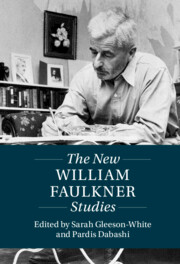Book contents
- The New William Faulkner Studies
- Twenty-First-Century Critical Revisions
- The New William Faulkner Studies
- Copyright page
- Contents
- Notes on Contributors
- Introduction
- Part I Approaches
- Part II Cultures
- Chapter 7 Queering Faulkner: Content, Structure, Failure
- Chapter 8 Faulkner and Women
- Chapter 9 “A Shape to Fill a Lack”: Faulkner and Indigenous Studies
- Chapter 10 On Thingification: Faulkner and Afropessimism
- Part III Interfaces
- Index
Chapter 10 - On Thingification: Faulkner and Afropessimism
from Part II - Cultures
Published online by Cambridge University Press: 23 June 2022
- The New William Faulkner Studies
- Twenty-First-Century Critical Revisions
- The New William Faulkner Studies
- Copyright page
- Contents
- Notes on Contributors
- Introduction
- Part I Approaches
- Part II Cultures
- Chapter 7 Queering Faulkner: Content, Structure, Failure
- Chapter 8 Faulkner and Women
- Chapter 9 “A Shape to Fill a Lack”: Faulkner and Indigenous Studies
- Chapter 10 On Thingification: Faulkner and Afropessimism
- Part III Interfaces
- Index
Summary
In Faulkner, Mississippi (1996), the Martiniquan scholar-artist and philosopher Édouard Glissant recalls teaching at Southern University – a historically Black university in Baton Rouge, Louisiana – and “insist[ing], before an audience of African-American students and professors … that there is room for reconsideration of Faulkner, for a fresh reading and study of his works.”1 Given that “Faulkner had no interest in associating himself either with them or with their future when he was writing his books,” Glissant maintains that his Black audience’s thoroughgoing rejection of Faulkner’s contempt for Black life was warranted – indeed, “no kind of literature [i]s worth the price of thingification.”2 Glissant himself argues elsewhere that Blackness operates in Faulkner’s work “as a generalizing signified (signifé),” in which, through a process of “reductive objectification,” Black life is intentionally displaced from its explicit context so that Faulkner might make universalist claims disconnected from, and in the process malforming and distorting, it.
- Type
- Chapter
- Information
- The New William Faulkner Studies , pp. 166 - 182Publisher: Cambridge University PressPrint publication year: 2022

